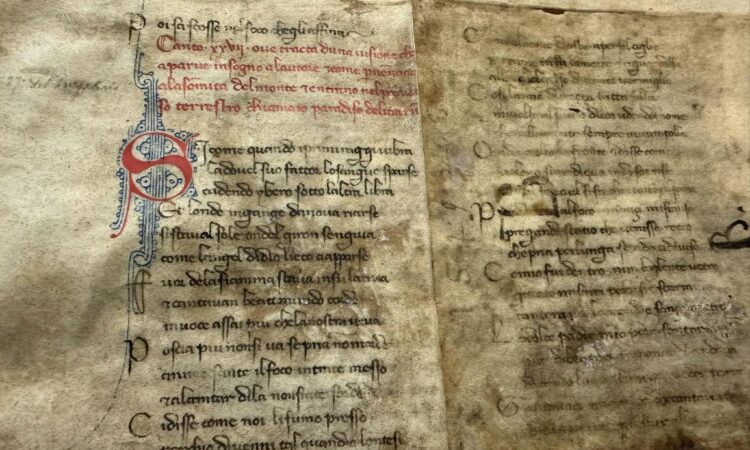A remarkable historical discovery has been made in La Spezia, Italy, during the relocation of the State Archive. Two authentic pages from the first printed edition of Dante Alighieri’s Divine Comedy—one of the most influential works of Western literature—have come to light.
The find was announced by Mayor Pierluigi Peracchini in an interview with Il Secolo XIX. The pages, featuring passages from the Purgatorio and Paradiso, are believed to belong to the groundbreaking 14th-century edition, often referred to as the “Pax Dantis,” a term symbolizing the cultural and political peace fostered by Dante’s legacy in medieval Italy.
“This is an extraordinary event—a discovery of immeasurable value,” remarked Mayor Peracchini. “We will work closely with the Ministry of Culture to create a public exhibition showcasing these treasures. The Pax Dantis, which marked the end of the conflict between the Malaspina family and the bishops of Luni, is a significant yet underexplored chapter in our city’s history. These pages are a testament to La Spezia’s connection to this cultural heritage.”
What Is the Divine Comedy?
The Divine Comedy is a narrative poem written by Dante Alighieri between 1308 and 1320. Widely regarded as one of the greatest literary works of all time, it tells the story of Dante’s journey through the three realms of the afterlife: Hell (Inferno), Purgatory (Purgatorio), and Paradise (Paradiso). Guided first by the Roman poet Virgil and later by Beatrice, Dante explores themes of sin, redemption, and divine justice. The work is celebrated for its vivid imagery, innovative use of the Italian vernacular, and profound exploration of philosophical and theological concepts.
The First Printed Edition of the Divine Comedy
The Divine Comedy, completed by Dante in 1320, explores the poet’s allegorical journey through Hell, Purgatory, and Paradise. It became one of the earliest works to be printed with moveable type, with its first edition produced in Foligno, Italy, in 1472. This edition played a pivotal role in the diffusion of Dante’s masterpiece during the Renaissance, making it accessible to a wider audience and cementing its status as a cornerstone of Italian and global literature.
The discovery in La Spezia not only sheds new light on the preservation of early printed works but also reaffirms Dante’s enduring influence on Italian culture. The forthcoming exhibition promises to attract both scholars and enthusiasts, eager to witness this rare piece of literary history.
Discover more from Florence Daily News
Subscribe to get the latest posts sent to your email.

